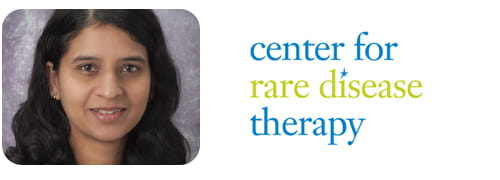
Co-Director, Neuro-genetics Clinic
Interim Director, UPMC Children’s Center for NeuroGenomics (CCNG)
Dr. Deepa Rajan has been fascinated by the human brain since she was a teenager.
“Even before I started medical school, I had an interest in neurology,” she says. “I think the brain is the most intriguing organ. I’m not sure we will ever fully understand everything about how the brain works, but the quest to understand it better than we do now is part of what keeps me going.”
As co-director of the Neurogenetics Clinic at UPMC Children’s Hospital of Pittsburgh, Dr. Rajan sees patients who have often severe neurologic and other symptoms that have so far eluded diagnosis, as well as patients who have been diagnosed with rare neurologic conditions caused by genetic abnormalities.
Before being seen at the Neurogenetics Clinic, many children and their families have been through a “diagnostic odyssey” involving visits to multiple medical specialists, each of whom may conduct a different battery of tests to try to identify a cause for the child’s symptoms. One of the clinic’s goals is to ensure that each child receives a proper diagnosis and a care plan designed to meet his or her individual needs.
“Many of my patients are undiagnosed, or they are diagnosed with diseases that we don’t yet have standard treatments for,” says Dr. Rajan. “But once we have a diagnosis, we can connect patients with treatments available anywhere in the world, and we are now able to enroll some patients in clinical trials of novel treatments that may help them.
“Although the field of neurogenetics is still in its infancy, the future is promising,” she says. “Every patient we see helps us to better understand the biology of neurogenetic diseases, and what we learn may help us to treat not only this child’s disease, but also children with other neurogenetic disorders.”
After graduating from medical school and completing an internship in her native India, Dr. Rajan came to the United States to complete a residency in pediatrics at the Children’s Hospital of Michigan in Detroit. She joined UPMC Children’s Hospital in 2010 as a resident in child neurology. In addition to serving as co-director of the Neurogenetics Clinic, Dr. Rajan is an assistant professor of pediatrics at the University of Pittsburgh School of Medicine. She is board certified in pediatrics and neurology, with special qualifications in child neurology and epilepsy.
Dr. Rajan says that she is frequently inspired by her young patients.
“Life throws many challenges at these children, and each of them always faces their particular set of challenges without complaint,” she says. “What is most meaningful for me is to walk the journey with each patient, even when the treatment I’m able to offer them falls short of what I would wish for.”
The ability to diagnose a disease through genetic testing is relatively new, says Dr. Rajan.
“Previous generations did not have access to the advanced genetic testing technologies that are available now,” she says.
The diagnosis of a genetic disease in a child often has consequences for the entire family. For example, families may realize that one or more members of the extended family might have had the same condition, although it was never formally diagnosed. And if it becomes clear that a child’s disease was inherited from a parent, the family must wrestle with whether other children, born or yet to be born, might also be affected. In such cases, according to Dr. Rajan, there is a sense in which not only the child with the diagnosis but also the rest of the family becomes her patient.
Because neurogenetic diseases may affect multiple systems throughout the body––for example, the heart, the digestive system, the ability to walk–– an interdisciplinary team approach is essential to diagnosing and treating them, says Dr. Rajan. The Center for Rare Disease Therapy at UPMC Children’s offers exactly this kind of collaborative environment, she says.
“I’ve never met anyone here who isn’t approachable,” she says. “It means so much when specialists from different disciplines can work together and share their perspectives.”









